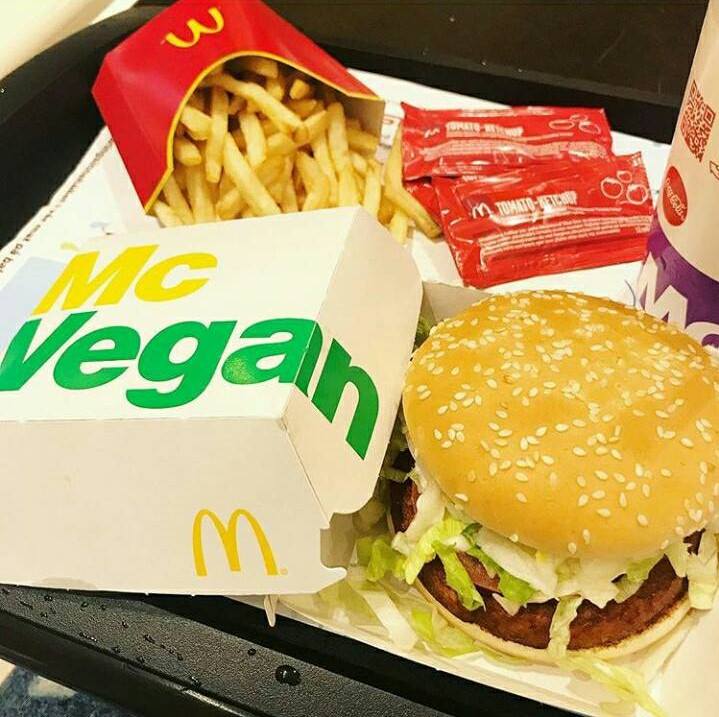Part III of a series of 2018 animal news in review.

McDonald’s McVegan made a European debut to rave reviews. Early in the new year, I’ll be doing a radio interview highlighting the biggest animal stories and trends of 2018 and what the future holds for 2019. Although I’ll be primarily speaking about all the ways we got closer to winning the war against shelter killing (and we are more than 90% of the way there), I may sneak in a couple of stories about veggie burgers and a whole lot more. Details coming soon:
Earlier, I posted that 2018 marked a tipping point when it comes to dogs we classify as “pit bulls.” In Part II of the year in review, I also said the same for community cats. There was a time, not so long ago, when dogs classified as “pit bulls” and “feral” cats were the most at risk animals in U.S. pounds. That has dramatically changed in many communities, with dozens reporting placement rates as high as 99% for each. 2018 added to those numbers. But it wasn’t just dogs and cats who benefited in 2018; so did plenty of other animals.
For example:
- For the first time in U.S. history, a judge issued a habeas corpus order on behalf of an elephant “to determine whether she should be released from her imprisonment” at a zoo. Historically, U.S. courts have repeatedly ruled that non-human animals “are not legal persons who have a right to be free.” That view has begun to crack.
- California passed legislation to make it illegal to sell cosmetics and hygiene products, such as deodorant and shampoo, that are tested on animals or have ingredients tested on animals. Although the law does not go into effect on Jan. 1, 2020, companies wanting to sell their products in California — including Proctor & Gamble, Gillette, and others — will have to stop torturing animals. And as the largest consumer market in America where California goes, so eventually goes the nation.
- San Francisco and Los Angeles banned the sale of fur, the largest cities in America to do so. Almost immediately, clothing companies and fashion designers announced they were dropping fur from their labels.
- Several companies reported breakthroughs in synthesizing real meat, which will soon hit store shelves and restaurant menus. It is made from a one time draw of stem cells. The stem cells are then replicated in a laboratory and grown in an animal-free medium to produce real meat from animals without killing. No animals will die. And no one has to be convinced to change their diet.
- A German company figured out how to sex eggs just a few days after fertilization and promised to make the technology available for free to all hatcheries by 2020. In the meantime, their eggs are already for sale in Germany. Every year, six billion baby male chicks are either gassed to death, suffocated, or ground up alive in giant macerators because they serve no purpose to the egg and “broiler” chicken industry. The new technology will spare billions of little boys from being killed shortly after birth.
- The United States, European Union, Canada, Iceland, Norway, Denmark, Russia, and other countries have signed a 16 year agreement not to allow commercial fishing in Arctic “marine ecosystems that have only recently become accessible because of the melting ice cap.” The deal is being called “unprecedented” because it is the first international agreement that doesn’t just regulate commercial fishing, but effectively bans it.
And more.
But it was the explosion in plant-based foods, and thus a decline in the number of animals killed for food, that is the top story of 2018 when it comes to other animals. As the number of people reducing or eliminating animal-based foods from their diets is dramatically increasing, so is the availability of plant-based foods in supermarkets and restaurants. Acknowledging the trend, California passed a law which requires jails, prisons, hospitals, and healthcare facilities to offer a vegan option at every meal. And Sodexo, a global food-service company, which serves tens of millions of people every day in corporate and hospital cafeterias, school dining halls, stadiums, and other institutions, launched new menus featuring 200 plant-based recipes across its North American accounts. But the one food that has eclipsed all the others is the veggie burger. In addition to greater authenticity in taste, texture, and mouth feel, veggie burgers became ubiquitous.
In 2018, restaurants across North America, Europe, and elsewhere announced new veggie burgers on their menus and many, such as A&W in Canada, quickly sold out. This includes McDonald’s in several European countries, Burger King in Australia, and White Castle, Shake Shack, Red Robin, Johnny Rockets, Denny’s, Habit Burger, and other chains in the U.S. You can also get veggie burgers at many, if not most, major league ballparks and an increasing number of basketball and football stadiums.
At the same time, the number of 100% plant-based fast food restaurants has also exploded. VeganBurg, which opened a vegan burger joint in San Francisco two years ago, announced plans to open 300 more stores. Next Level burger, a new vegan burger chain, announced plans on opening 1,000 locations nationwide over the next five years. Plant Power, a new fast food restaurant called the “vegan McDonald’s,” has already expanded to three locations and expects to open 10 more in the next year. And Veggie Grill, Amy’s, and Native Foods are also either expanding or have restaurants in various cities.
If 2018 stood for anything, it was the year of the veggie burger. And that’s good news for cows.
————-
Have a comment? Join the discussion by clicking here.